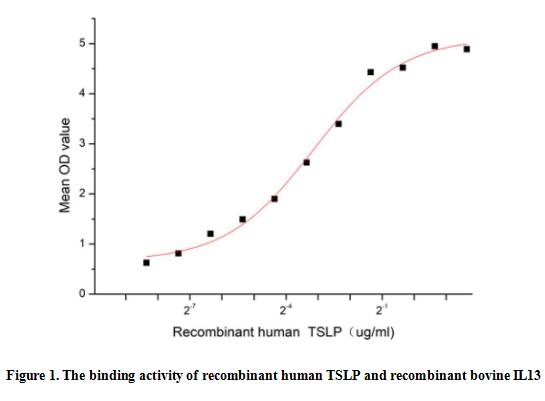Active Thymic Stromal Lymphopoietin (TSLP)
- Product No.UAPB320Hu01
- Organism SpeciesHomo sapiens (Human) Same name, Different species.
- Buffer FormulationPBS, pH7.4, containing 0.01% SKL, 5% Trehalose.
- TraitsFreeze-dried powder
- Purity> 95%
- Isoelectric Point9.6
- ApplicationsCell culture; Activity Assays.
- Download Instruction Manual
- UOM 10µg50µg 200µg 1mg 5mg
-
FOB
US$ 156
For more details, please contact local distributors!US$ 390
For more details, please contact local distributors! US$ 780
For more details, please contact local distributors! US$ 2340
For more details, please contact local distributors! US$ 5850
For more details, please contact local distributors!
ACTIVITY TEST of the Active Thymic Stromal Lymphopoietin (TSLP)

Thymic stromal lymphopoietin (TSLP) is a member of the IL-2 cytokine family and a distant paralog of IL-7. TSLP is a pleiotropic cytokine that acts on multiple cell lineages, including dendritic cells, T cells, B cells, neutrophils, mast cells, eosinophils and innate lymphoid cells, affecting their maturation, survival and recruitment. It is best known for its role in promoting type 2 immune responses such as in allergic diseases. Interleukin 13 (IL13) is a critical downstream element for TSLP-driven allergic inflammation. Thus a functional binding ELISA assay was conducted to detect the interaction of recombinant human TSLP and recombinant bovine IL13. Briefly, TSLP was diluted serially in PBS with 0.01% BSA (pH 7.4). Duplicate samples of 100 μl were then transferred to IL13-coated microtiter wells and incubated for 1h at 37℃. Wells were washed with PBST and incubated for 1h with anti-TSLP pAb, then aspirated and washed 3 times. After incubation with HRP labelled secondary antibody for 1h at 37℃, wells were aspirated and washed 5 times. With the addition of substrate solution, wells were incubated 15-25 minutes at 37℃. Finally, add 50 µL stop solution to the wells and read at 450/630 nm immediately. The binding activity of recombinant human TSLP and recombinant bovine IL13 was shown in Figure 1, the EC50 for this effect is 0.11 ug/mL.
USAGE of the Active Thymic Stromal Lymphopoietin (TSLP)
Reconstitute in 10mM PBS (pH7.4) to a concentration of 0.1-1.0 mg/mL. Do not vortex.
STORAGE of the Active Thymic Stromal Lymphopoietin (TSLP)
Avoid repeated freeze/thaw cycles. Store at 2-8°C for one month. Aliquot and store at -80°C for 12 months.
STABILITY of the Active Thymic Stromal Lymphopoietin (TSLP)
The thermal stability is described by the loss rate. The loss rate was determined by accelerated thermal degradation test, that is, incubate the protein at 37°C for 48h, and no obvious degradation and precipitation were observed. The loss rate is less than 5% within the expiration date under appropriate storage condition.
INCREMENT SERVICES
BCA Protein Quantification Kit
Molecular Mass Marker for Protein
Monoclonal Antibody Customized Service
Polyclonal Antibody Customized Service
Protein Activity Test Experiment Service
Electrophoretic Mobility Shift Assay (EMSA) Experiment Service
Buffer
Lentivirus Packaging Experiment Service
Adenovirus Packaging Experiment Service
Real Time PCR Experimental Service
Spike RBD Protein (S-RBD)
Protein G
Protein A



